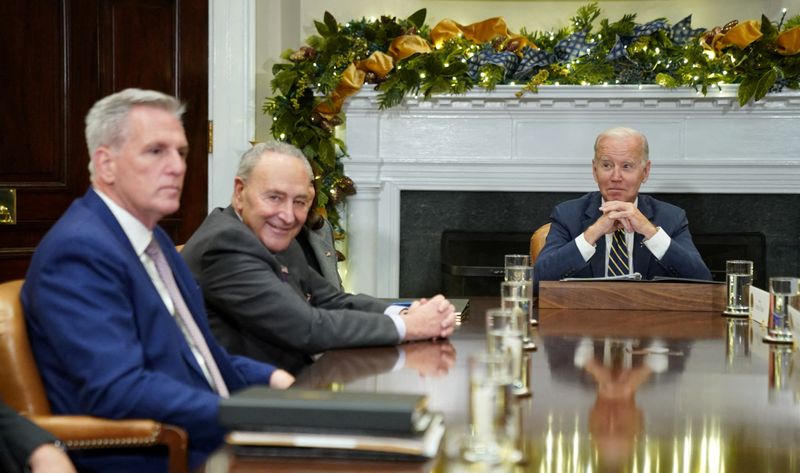By Andy Sullivan
WASHINGTON (Reuters) - A Democratic president. A new Republican majority in the U.S. House of Representatives pushing for sharp spending cuts. A rapidly growing pile of debt - and a showdown that threatens to throw the global economy into turmoil.
Sound familiar?
Those elements driving the debate over raising the federal government's $31.4 trillion debt ceiling were also in place back in 2011, taking the country to the brink of default and prompting a downgrade of the country's top-notch credit rating.
Veterans of that battle warn that this time around the politics and math are tougher, making it more difficult to find a resolution until the government is about to run out of money - or after it has.
"This year is going to be much harder than 2011, because of the shrill nature of the political discourse," said Charlie Bass, a Republican who served in the House during that time.
Unlike most other developed countries, the United States puts a hard limit on how much it can borrow. Because the U.S. government spends more than it takes in, lawmakers must periodically raise the debt ceiling.
As in 2011, Republicans aim to pair this year's debt-ceiling hike with sharp spending cuts to narrow annual budget deficits that have ballooned in recent years due to tax cuts and COVID-19 relief.
President Joe Biden insists that Congress must raise the debt ceiling without other conditions and has vowed not to negotiate with Republicans. He is due to meet top House Speaker Kevin McCarthy on Wednesday for talks on how to avoid a default that Treasury Secretary Janet Yellen says may come as soon as June.
Both leaders lived through the 2011 showdown, Biden as vice president to Democrat Barack Obama and McCarthy as the No. 3 House Republican.
Eric Cantor, who as the No. 2 House Republican spent hours with Biden trying to find a solution, said the president's no-negotiations stance may prove unsustainable.
"He was very much a conciliator at that point, so this is very different right now," Cantor said in an interview. "I'm not sure how long it lasts."
Biden and several aides still serving under him were scarred by the 2011 negotiations, according to two officials granted anonymity to discuss views within the administration. They were initially shocked that hardline Republicans would even broach the subject after years of drama-free debt-ceiling hikes and then decided to negotiate to avoid the worst.
SMALL, POWERFUL RIGHT WING
McCarthy will have to try to balance the demands of a vocal right wing in his party with the reality of divided government.
His grip on power is tenuous. Republicans hold a narrow 222-212 majority in the House, compared with their 242-193 majority in 2011, which will require moderates and conservatives to stick together.
To win the speaker's gavel after Congress convened in January, McCarthy agreed to enable any single member to call for a vote to unseat him, which could easily lead to his ouster if he seeks to work with Democrats.
McCarthy also agreed to place three hardline conservatives on the Rules Committee, which sets the agenda for the House floor. That could enable them to block any compromise from even coming up for a vote.
"It's an obstacle we didn't have to worry about in 2011," said Brendan Buck, who served as an aide to then-Speaker John Boehner.
Democrats hold a narrow Senate majority, as they did in 2011, and Republican leader Mitch McConnell is again in a position to help shape the outcome. Any agreement that emerges from that chamber will need bipartisan support, which could prove difficult for a Republican House majority to accept.
Some House Republicans protested when McConnell in December 2021 cut a deal to raise the debt ceiling and avoid default.
Only one in four Republicans serving in the House today held their seats in 2011 and observers said they may not be fully aware of risks involved with courting default - or the reality of divided government.
"There's some lessons that can be taught and some lessons that can only be learned," said Jon Lieber, a former McConnell aide.
Some newer Republican lawmakers have absorbed former President Donald Trump's confrontational approach to governing, which adds another layer of risk, said Bass, the former Republican lawmaker.
"I think they would rather see the United States go bankrupt, the dollar collapse, and see people's fortunes go down the tubes all to make a political point," he said.
Steve Stivers, a Republican who served in the House from 2011 to 2021, predicts that Washington will find a solution before the Treasury Department runs out of money.
"That's what things like the debt ceiling are built for - they're forcing mechanisms that create an artificial deadline," he said.

Others are less certain.
"I think that the possibility of miscalculation runs higher today than it did in 2011," said Neil Bradley, a former top Cantor aide.